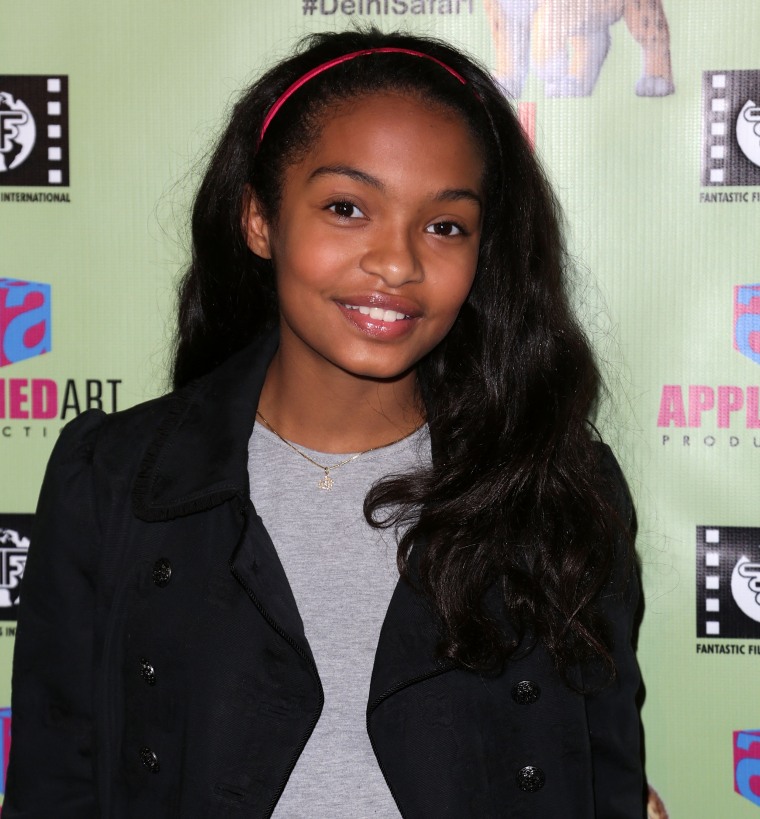Yara Shahidi is perhaps best known for her role as Zoey Johnson in the TV show "Black-ish," which she now reprises in the spinoff "Grown-ish." But the 19-year-old actress is also an activist who founded a mentoring organization called Yara's Club and was accepted to Harvard with a recommendation letter from Michelle Obama. The young role model now has a Barbie doll made in her likeness and is partnering with the toy brand to close the Dream Gap and level the playing field for girls.
I'm Yara Shahidi, and I love my hair because it's a quite literal representation of the amalgam of identities that make myself who I am. It's a mixture of the curls that my baba has and a mixture of the curls that my momma has.
Also, I can't help but to take up space when my hair is out. And so I feel like it's constantly serving as a reminder that I deserve to take up the space that I'm in. You know, for a long time I have been self-conscious about how much space I'm taking up, quite literally.
Like, "Oh, can people see behind me?" And walking in with this amount of hair on my head, I have had to feel confident. It's helped me feel confident in saying that I deserve to be here and saying that I'm comfortable being seen and visible.
And then if I go to just my family's hair, it's that we all have different curl patterns. I just love how unique and individual our curls are to us, in representing who we are and representing our heritage. I feel like hair is one of the best examples of how nonmonolithic one community can be.
There was a period of time where I did straighten my hair quite a bit and it started, actually, for work purposes. I had never really straightened my hair until it was requested for work. And then I remember that kind of subliminal idea of feeling more polished when my hair was straightened or even those moments of people just saying, like, how much better they liked my straight hair than my curly hair.

I think I had to go through a reintroduction, almost, with my hair. I've been heat-free for three years. I've only really used a blow-dryer to blow out my curls when they're wet, but no irons of any kind.
And it's been a lovely process of waking up and my curls being as curly as they can be, and just really appreciating them and being, like, I wouldn't have it any other way. I think it's really encouraged and motivated my work for equity, because there's all sorts of politics put behind respectability and who's considered polished and professional.
Because each member of my family has different textured hair, it's been an ongoing conversation just about how we feel best and how we feel ourselves, especially in spaces and industries that make you feel as though you are the anomaly for whatever reason.
My mommy has always been right there (for me) in styling and caring for my hair. I mean, I think what's very funny is that we have different textures. So, I have 3C hair. She has 4C hair. And we have both gone through this journey together of figuring out what works for us.
I think what's been nice is just her level of transparency in this entire journey, of those times in which we wake up and we're not feeling like we're in love with our hair.
We have this conversation about self-love as though it's just something you wake up and decide, like, "Today I love myself." Great.
That can be nerve-wracking, too. The idea, like, "Am I the only one going through this? Am I the only one who isn't head over heels in love with myself and what's happening?"
I think first and foremost, how you decide to wear your hair is completely up to you. And I know so many times there's pressure swaying either way. I know so many times there's commentary on your heritage, depending on how you wear your hair, of being, like, "Well, you're not committed enough if you're not natural," or, "Oh, you're doing this," or falling into this trope.
It's a process, an everyday process of some days waking up and loving it. I think it's about finding a community in which you're in constant conversation, because it really contextualizes your feelings of when you do feel love for your hair, when you do feel inadequate and even acknowledging, like, "That's OK to feel that way."
To the young girls that look up to me, first and foremost, I have to say thank you. I appreciate the love, and I feel the love every day. But I always like to talk about how expansive we are; about knowing that being a girl, being a woman isn't even defined by your sex, but by your commitment, by your drive, by your community and the community you've chosen to be a part of.
This story has been edited and condensed for clarity. As told to TODAY's Emily Sher.
